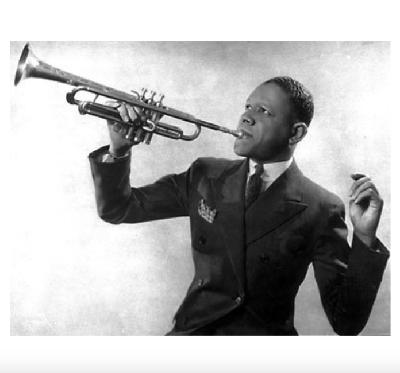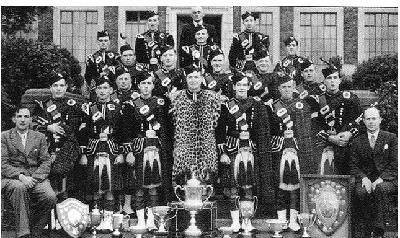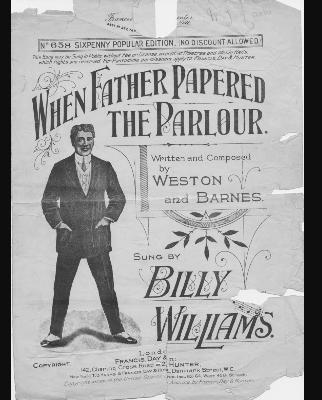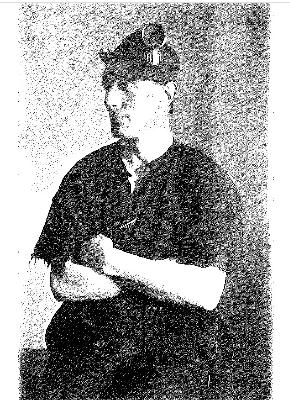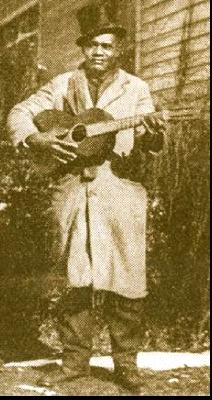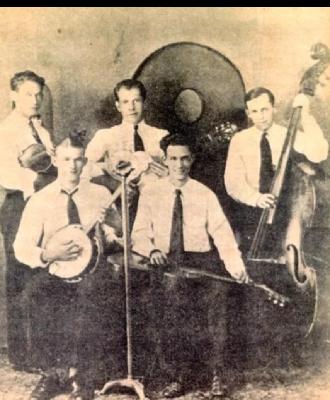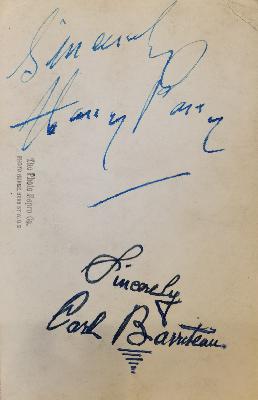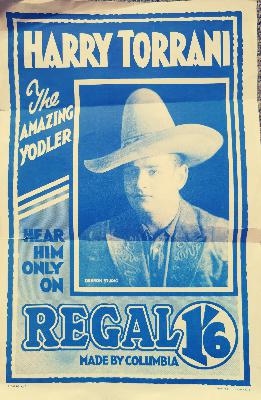Discover Forgotten Songs from the broom cupboard
Forgotten Songs from the broom cupboard

104 Episodes
Reverse
This really is it folks! Episode 100, final and last Forgotten Songs from the Broom Cupboard podcast. No Sinatra type returns this time. Hope you enjoy this 90 minute trawl through some old favourites. I'm not abandoning the cause and will be using 78rpm records for a couple of drama type projects. Link below to one. The Brownbread Tapes. He's a man who just might have a bit of a dodgy occupation. Twelve episodes in all, done to various 78 records. Short and hopefully sweet. https://thebrownbreadtapes.libsyn.com Here are the artists in our finale- Bob Skyles, Eddie Peabody, Winifred Atwell, Harry Parry, Jelly Roll Morton, Fats Waller, Kay Starr, Tenneesse Ernie Ford, Frank and James McCravy, Teresa Brewer, Joe Turner, Jimmie Rodgers, Harry Torrani, Michael Holliday, Billy Banks, Hoagy Carmichel, Michijakko, Bob Hamilton Trio, Bessie Smith, Saunders King, Hot Lips Paige, Lou Ella Robertson, Tiny Bradshaw, Lulu Zeigler and to see us out, Nat King Cole. The utterly marvellous My Flaming Heart. Its been an absolute pleasure. Stay safe, be happy and healthy.
Hardly forgotten but Frankie Laine certainly doesn't get the credit he deserve in the history of pop. An astonishing 75 year career. Singer, songwriter and actor. A big powerful voice that succeeded in all genres of music he tackled. Acknowledged as precursor to rock and roll. He happened to be a great guy too. Here he gives us- Some day, Love is such a cheat, The little boy and the old man( duet with Jimmy Boyd.) Your cheatin' heart and, of course, Blowing wild. Eartha Kitt starts us off with Cest si bon. Cherokee Canyon from Tex Beneke, Cherokee from Charlie Barnet. See what I did there. An artist that Frankie Laine admired as a young man was Gene Austin, falsetto crooner and songwriter. We hear him singing- I've grown so lonely thinking of you and then two interperations of Austin- Skilkret's Lonely Road. Jules Bledsoe sings the original song that was used in Showboat. Bledsoe was the first black singer/ actor to regularly appear on Broadway. He was the original Joe in Showboat. Mugsy Spanier takes the song, written in the style of an African, American folk song, and makes it a jazzy, blues classic. Big noise from Winnetka from Bob Haggart and Ray Baudec, two members of Bob Crosby's Bobcats. Legend has it they improvised its composition while the rest of the band were taking a break. A cool track, string bass, drums and whistling. Listen to Baudec play the lower part of the bass with his drum sticks. Marvellous stuff.
Frankie Vaughan seemed to be constantly present on British Television in 1960s. Mr Moonlight they called him. He had a big voice and a big stage presence, top hat, bow tie and tails. He had many hits during the 1950s and had a brief career in Holywood. Most notably opposite Marilyn Monroe in Lets make Love. Here he gives us The Green door. Lita Rosa- Hernando's Hideaway. Rosa started her stage career at the age of 12. At 24 she was lead female singer with Ted Heath. A strong voice which probably never reached its full potential with the material she was given. Variety is the spice of life on Forgotten Songs. So next up is Tom Wright with Driving into Glasgae in a sour milk cairt. Its billed as traditional on the Beltona label. It's not but was written in 1914 by Tom Johnstone for the comedian J.C macDonald. It's in broad Scots. Two from a F.S favourite, Kay Starr- Too busy and If you love me. Dickie Valentine was a popular crooner in Britain through the 50s. Like many British singers he existed on a diet of American covers. He died in a car crash in 1971. Joan Regan and The Squadronaires give us Ricochet. The Squadronaires were the R.A.F big band. There is some confusion of her birth name and exactly where she was born. Again she did a lot of American covers through the 50s but her U.S recorded version of Don't talk to me of love become a Northern Soul classic. Languishing in the F.S colection has been this piece of US Billbord chart history from Tommy Edwards. It's all in the game was the first number one by an African American in the chart. Released in 1958 it was the biggest hit from this singer- song writer. He sadly died young at 47. Frank Ferera with Beautiful Love. He was a Hawaiian music pioneer. We go all posh with Air on a G string with Norbert Wethmar on violin. The only information I can be certain of about him are two references from The Radio Times in the late 1930s. Two performances with the BBC Orchestra. Florrie Forde was the Australian born grand Dame of British Music hall. Whose career spanned Victorian variety theatre to entertaining the troops in Aberdeen in 1940. She died after the performance, aged 64. Her songs included- Hold out your hand you naughty boy, Down at the old Bull and Bush and I do like to be by the seaside. Here she gives us When we were strolling around town. Maurice Winnick was another Manchester born musical child prodigy. As a teenager he was a band leader on a transatlantic liner. He had a succesful career through the 1930s and 40s. He died in 1960. He plays a lovely version of The Waltz you saved for me. The Platters need no introduction and neither does the song- Smoke gets in your eyes. Okay its not forgotten but how often do you hear it directly from the original 78?
Two Harrys to start us off. Parry- Trust and Parry and James with Memphis Blues. Henry Allen and his Orchestra- Dinah Lou. Allen was one of the major trumpeters of the Swing era and played with King Oliver, Fletcher Henderson, Coleman Hawkins and Louis Armstrong. Count Basie and his Kansas City seven- Lester Leaps in. Lester Young being the Lester. The group released six versions of the song between 1939- 1948. Sidney Bechet and his New Orleans Feetwarmers- Stormy Jones, Mugsy Spanier and his Ragtime Band- That Da, Da Strain. Robert Earl- If you love me. A popular tenor in the 1950s. His son, also Robert Earl ,is the founder of Planet Holywood restaurants. Orcestration is by Wally Stott. Musical director of Philips Records at the time. Stott was an arranger, composer and conductor. Worked with Shirley Bassey, Noel Coward, Dusty Springfield and Scott Walker, amongst others. As well as composing Film and T.V scores- from Watership Down to the music for the TV series Dallas. In 1970 Stott undertook gender reassignment surgery and lived the rest of her life as Angela Morely. She went on to have highly succesful career in the US. Amazing story and life. Perfect for Forgotten Songs. The luck of the Irish next, Jack Daly- When the poppies bloom again. He ran out of luck I'm afraid. Could only take about a minute of his warbling! Much beter is- Sydney MacEwan and She moved through the fair. MacEwan was an ordained priest born in Glasgow in 1908. He started his recording career in 1934 and work extensively on the BBC. He did many world tours. Very popular in his day. A favourite from George Formby- In a little Wigan Garden. We finish with the very dark Miss Otis regrets from Jay Wilbur and Elizabethan Serenade, from the Ron Goodwin Orchestra. Goodwin was a profilific film composer- Where Eagles Dare, 633 Squadron and the theme to the Margaret Rutherford Miss Marple film. Later used in 'Kill Bill'.
Stan Freberg starts us off with his version of The Banana Boat song.. 'too loud man.' Freberg was a comedian, musician, puppeteer, advertising creative director but, above all, satirist. Check out his version of John and Marsha. We have a bit of a British Dance Band fest- Geraldo- That lovcely weekend, vocals Dorothy Carless, Ernie Goldin- Making Whoopie, Roy Fox and his band- You Rascal You( vocals Nat Gonella, possibly Al Bowlly) Georgia on my mind, Nat Gonella and his Georgians- Georgia's gorgeous girl. I love Gonella's vocals. Harry Parry- Don't be that way and Bounce me brother with a solid four. Edmundo Ros- Rhumba Royale. Ros Lived to be a 100 and was one of the big promoters of Latin American music in Britain. Percival Mackay and his Kitcat band- Time will tell. Harry Parry played in Mackay's band. Primo Scala's Acordion Band- Hilly Billy medly. Primo Scala was very popular and did 100s of performances on BBC radio during the 30s and 40s. The man behind the band was Harry Bidgood. Harry Roy's Tiger Ragamuffins- Where did Robinson Crusoe take Friday on a Saturday night. Great version. We finish on a favourite. Mel Torme- Mountain Greenery.
Back after a three month break. What better way to start than with Bob Skyles and his Skyrockets with I'm gonna die with a broken heart. Three from the hugely popular Inkspots- Everyone is saying hello again, Thoughtless and one of their big hit Java Jive. Just one of their records alone, If I didn't care, sold 19 million copies. Their style rarely changed but they were ground breakers. They sold well to both black and white audiences. Ted Heath and his music with Walking Shoes. Two soporific songs next- Paul Robson with Just a wearyin' and Rosemary Clooney with Brahms lullaby. Should have put them at the end. We all could have nodded off. Not often we play the pipes on Forgotten songs but we have two tunes from The Bowhill Colliery and District band. Bowhill in Fife was the scene of a pit disaster in 1931 when 10 men were killed. Like many factories, foundaries, collieries Bowhill had a works band. This being Scotland a pipe band as well as a silver band. The Rhytmn Maniacs with the wonderfully titled- 'The gag song( She was only a bookmakers daughter.) To be fair it does have some funny lines. Max Darewski was a Manchester born child prodigy. At the age of 9 he was conducting a full orchestra. He had a successful career as a composer. Not convinced his genius was on display with this number- Shadow man. Sadly he died only aged 35. Edna Thomas was a African American actress and singer. She performed on Broadway and on film. Here she gives a very refined performance of Mamzelle Zizi. No need to tell you about Roy Rodgers, here singing A four legged friend. Thank goodness he mentions Trigger at the end! Alma Cogan advises Never tango with an Eskimo but in this weather we need all the heat we can get. Lionel Hampton gives laid back vocals to The mood I'm in. Naturally he gives us some vibrophone too. We finish with two BBC records. Charles Williams leads his orchestra with own composition, The Devils Gallop. This was the signature tune to Dick Barton, Special Agent. A 'cliffhanger' radio series that the BBC ran from 1946 to 1951. As we recorded this on Christmas we end with Come All Ye Faithfull, from the BBC Choir. I'm sure Lord Reith would approve. He was the stoney faced kill joy who ran the BBC for many years and he certainly wouldn't have approved of The Gag song. Far too ribald!!
Some comedy on budget record labels. Last chance plays for some, as they are a little ropey. We start with a right cheery number from comedian Bobby Comber- La-di-da-di-da. A popular entertainer through the 20s and 30s. I can find little about his history online. Plenty of history about Sandy Powell. Here he gives us Sandy the Doctor. Next Harry Leader and his Orchestra- Little man you've had a busy day(1934). Leader was a prolific band leader who operated under many different names and had a long career. He was particularly associated with the programme Workers Playtime. Vocals are by Dawn Davis. She sang with a few British bands in the 1930s and 40s, as well as a solo and in a duo. She notably dueted with Al Bowlly. She moved to Australia in the late 40s but returned to England in 1955. Unfortunately she was unavailable to get back into the entertainment business. She died in 1993, aged 83. Madame Nina Rae- Anne Laurie(1921) Other than being born in 1878 in Glasgow I could find nothing about her. Billy Williams, we've played before. Here he sings I'll lend you my best girl. Australian born he had a highly successful career in British Music hall. He died in 1915. Tommy Handley was another very successful comedian. Especially during WW2 in his radio programme ITMA- Its that man again. He gives us 'How many pips are there in a pomegranate'(1929). Charlie Higgins- Down in the field where the buttercups grow. Another popular comedian from the 1930s. He played the London Palladium three times. He billed himself as 'A fool if only he knew it.' Ernest Butcher- I sing as I limp along(1935). A character actor from 1930s to 1950s. Nothing really online that talks about his singing. We have two of his records in the F.S collection. This track is self penned. Savoy Havana band- Dear love, my love. They were the resident band at the Savoy Hotel in London, 1921 to 27. Started by Bert Railton, they did the British Premier of Gerswin's Rhapsody in Blue. We get all modern to end the show. Troubled Welsh diva with Dorothy Squires- I walk behind you(1953). Composed by her partner of the time Billy Reid. She was successful throughout the fifties and into the 60s but her faded away and she died in 1998. We finish with John Kirby- Undecided and the spacey Dawn on the desert-1938 and 1939. Kirby started on the trombone, switched to tuba and ended up on the double bass. He played in many band and started his own well thought of jazz ensemble and orchestra. He sadly died young in 1952.
A couple of cheery and cheeky wartime songs. George Formby with Ukelele Man. Not nearly enough ukelele playing on it quite frankly. Next Dave Willis with ARP( Air raid patrol.) More commonly known as My Wee Gas Mask. Probably the best known Scottish song from WW2. Joe Corrie was a Fife coal miner, poet and playright. His style was naturalistic and his subject matter the working class. He was pretty much ignored by the Scottish theatre establishment of the time. Here we have The shilling a week man. A humerous tale of money owed, performed in broad Scots. Humerous it maybe but for many life was 'hand to mouth' and the shilling a week man was a fact of life. Bunny Berigan's blues boys with Chicken and Waffles and then he plays trumpet on Gold diggers of 1933 with The bell boys of Broadway. Two from the magnificent Mildred Bailey with her orchestra- St Louis Blues and with her Oxford Greys- Arkanas Blues. Great vocals from her. We split those two tracks with Charlie Barnet and Wandering blues, vocals by Mary Ann McCall. Ring dem bells from The Harlem Footwarmers(1929.) They also performed under 25 aliases and members included Duke Ellington and Cottie Williams. Johnny Dodds and his orch- Red onion blues. His brother 'Baby' Dodds is on drums. Bit of Boogie from Will Brady's six Texan hot dogs- Basin Street boogie(1941) Not the best condition but Taft Jordon and his mob play Devil in the moon. Taft only made two records with own group but played with the best, from Ella to Ellington. His trumpet can be heard on Miles Davis's Sketches of Spain. Quite an acolade to be asked to play trumpet with Miles! E.C Kirkeby Wallace bandleader, songwriter, vocalist and manager. He looked after Fats Waller. He also started the Californian Ramblers while working at Columbia. Benny Goodman with Blues in the night, vocals by Peggy Lee. Early peggy. She certainly hits some uncharactistic high notes toward the end. We finish with Freddy Gardner and his Swing Orch. The self composed 10am Blues from 1939. A great track from this forgotten British saxphonist, who died young at 39. Its an Indian pressing on the Rex label.
In episode 91 we look at black artists who came to Britain from the 1920s to 1950s. Well the exception is Joe Deniz who was born in Cardiff. We start with Leslie(Hutch) Hutchinson. Born in Grenada in 1900 he arrived in England in the late 20s, via a stint in the U.S. He rapidly become the darling of high society with a refined, well mannered voice and piano. He made many records and appearence through the 1930s and 40s. His personal life was, well lets' say, lively. He had seven children by six different women and had affairs with Cole Porter, Ivor Novella, Tallulah Bankhead and Edwina Mountbatten. Amongst others. By the 1950s his career had faded away and he died in London in 1969. Turner Layton and Tandy Johnstone were both born in the USA and met in New York. Their musical partnership found almost immediately success. Like Hutch they were adored by high society. They came to England in 1924 and their popularity grew. They are reckoned to have sold over 10 million records between 1924 and 1935. They appeared on the BBC and all over Europe. Their partnership was dissolved in 1935 when Tandy Johnstone was involved in a highly public divorce case. He eventually returned to the US, having married Raymonde Sandler, the subject of the divorce. He died in 1953. Layton stayed in Britain and had a successful solo career. He died in 1978. Archie Lewis was born in Jamaica in 1918 and came to Britain in 1942 to work in a munitions factory. He already had the a singing career in Jamaica and was soon working for ENSA in Britain. Here he met band leader Geraldo and he become one of his vocalists. He was very popular live and on record. His 1946 recording of While the Angulis were ringing sold over a million copies. He eventually returned to Jamaica, still performing live and on record. He died in 1988. I feel he really is a forgotten man in British poular music and an important part of the history of black artists on British entertainment. See a brief clip of him here: https://youtu.be/Is4WFhhJARg All these four artists were very much in the style of white vocalist of the time. In Hutch, Layton and Johnstone I'm thinking of Noel Coward. Archie Lewis was known as The Caribbean Crosby. Our only female artist here is Winifred Atwell. Trinidad born pianist. There really is nothing elite about her. She went straight for the popular and her Let's party records were No1 sellers. I prefer her boogie woogie. No need to tell you that much about Paul Robson and Josh White. Both men spent time, almost in exile in Britain, from their native US because of their political beliefs. We've played Carl Barriteau before. He emerged from Ken Snakehips Johnson's West Indian band and had a successful solo career. Joe Deniz was born in Wales, in the Tiger Bay docks area of Cardiff. He was one of three professional guitar playing brothers and was, of course, a main stay of Harry Parry's band. All these artist were pioneers in breaking down race barriers in British entertainment. Their work is mostly forgotten now or certainly under valued. Playlist: Hutch- The London I love, For all I care. Layton and Johnstone- Just an echo in the valley. Turner Layton- Question and Answer. Archie Lewis- In the land of begining again, The mission of the rose. Paul Robeson- Water Boy. Josh White- Hard time Blues. Winifred Atwell- Let's party part 1, Highland Boogie. Carl Barriteau( vocals Mae Cooper)- Primrose Hill, I'll get by(as long as I have you.) Harry Parry and his Radio Rhythm Club Sextet- Champagne. Joe Deniz on guitar.
Authentic cowboys, well sort of, start us off. Mac McClintock left home to join the circus. Between that, and becoming a singer, actor, composer and poet, he did a whole stream of incredible jobs. Railroading in Africa, Mule train in Philipines and news gatherer in China. He was a devoted union man and wrote Hallelujah I'm a bum and Big rock candy mountain. Here he gives us The old Chisholm trail. Jules Allen sings Zebra dun. He probably was a real life cowboy at one time, driving cattle from the Mexican border to Montana. The Cartwright Brothers sing Texas Ranger. The tune and sentiment are familar. It's yet another version of The unfortunate Rake. Into Western Swing. The right key but the wrong keyhole- Cliff Bruner Texas Wanderers, I can't dance(I've got ants in my pants)- Rob Newman and his boys, Wonder Stomp- Texas Wanderers and Devil with the devil- Rob Newman and his boys. Bob Wills with Bob Wills boogie from 1946. Very rock and roll in my opinion. Jazz on 78rpm break with Teddy Wilson and his Orchestra. I cried for you- vocals by Billie Holiday and, a new favourite of mine, Blues in G sharp minor. Composed by Wilson. He was rated as the best swing pianist of his time. Back to Western Swing and Milton Brown and his Brownies. St Louis Blues. Great, trippy version, with a real tempo shift toward the end. In El Rancho Grande- Milton and Durwood singing in Spanish. From 1937, a year after Milton's death, Durwood sings If you can't get five get two. We finish with the wonderfully upbeat tune from Virginian fiddler John Ashby- The 8th of January.
A good deal of Western Swing, some early country and a wee bit of blues. Have to give I haven't got a pot to cook(1936) another airing. Naughtiness from The Sweet Violet Boys. Jimmie Revard and his Oklahoma Playboys- Ride 'em Cowboy(1936). A Bob Wills song. My only Bob Skyles and his Skyrockets trabk on vinyl next- The Rhythm King. Milton Brown and his Brownies- Yes sir(1936). Chicken Reel Stomp(1937)-The Tune Wranglers. The also performed as Tono Hombres and sang in Spanish. Wonderful blues from Buddy Jones- Settle down blues(1939) Buddy recorded over 80 sides for Decca. On piano is Moon Mulligan. Not Max as I say 'on air.' Bob Dunn on Steel guitar. Amade' Ardoin- La Valse a Abe and Two Step Eunice. A pioneer of Cajun and Zydeco music on record. Much legend surrounds his death. It now appears he probably died of V.D in 1942. A unique voice and great accordion. The Georgia Crackers- Joe Diamond(1927). The duo also performed as the Coffer Brothers. Dupree's Rome Boys- 12th Street Blues(1929). A popular dance band number of the time, adapted perfectly for guitar and fiddle. Lil McClintock- Don't think I'm Santa Clause(1930). McClintock was a street musican in Clinton South Carolina and only recorded four sides for Columbia. Nothing is known of his origins or what happened to him. An obscure but talented artist that came and went. Frank Hutchinson- K.C Blues(1929.) Hutchinson is considered the best musician and singer of white country blues music and recorded around 40 sides for the Okeh label between 1926 and 1929. He played the steel guitar using a pen knife as a slide. He'd worked as a miner in Virginia. Died young at 48. I love this laid back track and his wee shout toward the end. We finish with that man Milton Brown and Hesitation Blues.
We open with Maurice Rocco- Rocco's Booogie Woogie and Tonky blues. An Australian Pressing on Decca, 1940. Never released in Britain. Rocco played piano standing up. Way before Jerry lee Lewis. Succesful during the 40s his star began to wane in the 1950s. A great shame, as what a performer and composer he was. He was murdered in Thailand in 1976. Big Joe Turner(vocals) and Pete Johnson(piano)- Roll 'em Pete and Going away blues. Roll 'em Pete is regarded as one of the most important precursor songs to Rock and Roll. Albert Ammons, Meade Lux Lewis, Pete Johnson and Joe Turner- Cafe Society Rag. Meade Lux lewis- Whistling Blues. Wingie Carpenter, Trumpter, singer and bandleader- Put me back in the alley. Vocals by Mae Hopkins. Who was mae Hopkins? Nothing about her on the internet, other than cutting four sides for Decca with Mozelle France in 1940. Sam Price and his Texan Bluesicians- How 'bout that mess. Pianist who performed in numerous bands right up until the 1980s. Throughout the 1960s and 70s he was a civil rights campaigner and activist. An amazing man. Vic Filmer and his Murray Club Band- If you can't sing whistle(1931). Excellent advice in my case. Nice quality track on the Piccadilly label. Been waiting for a Ken 'Snakehips' Johnson and his West Indian Dance Band record to turn up for a while. Here we have Seventeen Candles and Last time I will fall in love. Johnson was an important figure in the history of black British music. Originally from British Guyana his West Indian band brought a real flavour of US style band music to Britain. Johnson was sadly killed in a bombing raid in 1941, he was playing at The Cafe Paris in London. Members of the band joined other British groups and influenced British jazz for years to come. Yorke Desouza, Dave Wilkins and Joe Deniz worked extensively with F.S favourite Harry Parry. We have a wee flavour of George Formby Senior from 1920. This is on an Ariel Grand Records disc. He died the year after this recording, aged 46. He was a huge music hall and recording star at the begining of the 20th century. Elements of his act may well have inspired Chaplin's tramp. His upbringing was incredibly harsh and impoverished. A strong contrast to the height of his career when he was earning £350 a week(£40k in 2022). He was reluctant to allow his son into show business and sent him away for jockey training. Didn't stop young George though. He went on to become an even greater star. We finish with Buddy's Blues from Buddy Featherstonehaugh and his Radio Rhythm Club and the Gerry Mulligan Quartet. Yeah I know he's hardly forgotten but when do you hear him played directly from a 78 record?
All part of my campaign to make the Welsh born band leader of the 1940s and 50s more well known. Twelve tracks fresh in and out the crate. Well wooden box. Big thanks to Rod Boyd for the donation. First up- Oceans and Notions. Harry Parry Trio. Joe Deniz- guitar, Tom Bromley- bass, Roy Marsh- Vibraphone. Composed by Marsh. Harry Parry Sextet- Sweet Georgia Brown, My Blue Heaven, Alexander's Ragtime Band, Blue Lou, Java Joint, Doggin' around, Rose room. Travelling Blues- vocals Johnny Green. Boogie rides to Yorke- Piano by Jamaican born Yorke Desouza. He moved to France in the 1930s and England in the 40s. Excellent jazz pianist whose career faded away in the 1950s. Composed by Desouza and Parry. Great example of the talent Parry brought into the band. Viva Harry Parry!
A rousing start from Winifred Atwell with Cross hands boogie. Nellie Lutcher- Hurry on down. A wee bit naughty. She's a rather neglected R&B jazz singer and composer. Ruby Wright, the daughter of country singer Kitty Wells, with Boy you got yourself a girl. Jeri Southern- Call me tonight. A torch singer whose career sadly faded in the late 50s. Giselle McKenzie- Seven lonely days. Canadian born, popular in US T.V and musical theatre. Bill Perry's Entertainers from 1927 on a rare Puritan label. The Wisconsin record label only existed between 1917 and 1929. Jane Froman had a long and successful career in the US on radio, T.V, film and on record but what a tough life she had. Severely injured in an airplane crash in 1943 she struggled with pain for the rest of her life. Three band singers- Anita Boyer with Artie Shaw, Connie Haines with Tommy Dorsey and Jean Farrar with Harry Roy. Juthika Roy, a classical, devotional and singer in Hindi and Bengali films. Connie Boswell- This time its love. Professor J Earl Hines and his godwill singers- Get on board little children. Hines was a gossip singing pioneer with his Gossip choir at St Paul's church choir in L.A. He gave vocal training to a very young Etta James. Forgotten songs oldest record, so far. Bluebells of Scotland by Madame Derring. Recorded in August 1906 in London. What an amazing concept, a piece of history 116 years old. It cost me £1. Harry Parry and his Radio Rhythm club sextet with St Louis blues. Vocals by Rita Marlowe. Another singer with very little history. A fine voice, especially for the blues.
The fantastic voice of Kay Starr starts us off with: Rock and Roll Waltz(1954), Changing Partners(1954) and Wabash Cannon Ball(1948). The Three Kays with The Cuckoo. A popular English group in the 1950s. Cuckoo is probably a description of a lot of the rest of the content of the show. Albert Burdon with Albert before the means test(1931). I do quite like it. There are genuine gags and its quite subversive. The Street Singer with Trouble in paradise. Arthur Tracey was born Abba Avrom Tracovutsky in Ukraine in 1899. He originally used the name The Street Singer to avoid being banned from Vaudeville for appearing on the radio under his own name. Suzette Tarri performs The Boarding House. She was, what we'd call now, an observational comedian. Had a long career from the 1920s to 50s. Surely record of the week: Jack Hodges, the Raspberry King with Everything is fresh today. Eat more fruit he says, blowing raspberries! Thirteen Woman from Billy Haley. A sexiest dream. Who knew the dropping of an H bomb could be so positive. Bizarre. Victor Theremin was born Lev Therman in St Peterburgh in 1996 and was the inventor of the first commercially produced electronic instrument- The Theremin. He was also involved in espionage. Working with the notorious Soviet NKVD developing listening devices. The Theremin has been used in such films as Spellbound, The Day the Earth stood still and Hellboy. Next a 1916 version of Another little drink. Miss Louie Brooks, Jack Henty( the prolific Ernest Pike) and Charlie Collins. Charlie Collins was a songwriter of this era and earlier. Indeed it wrote some of the best known songs from the golden age of the British music halls- Dont dilly dally on the way, Boiled beef and carrots and Any old Iron? I can find no record of him performing though. Surely this is the same man? We finish with the Canadian born W V Robinson and Freaks of the mouth organ from 1926. Utter nonsense!!
We start with two firm favourites. Frankie Froba- Love song in 32 bars and Teresa Brewer- Wang, Wang Blues. Then we go west- sort of! Bradley Kincaid with The Miners Song. Two cowboy songs. A traditional sentimental tale from Peg Morland with Cowboy Jack. Morland lost half a leg in an accident while working as a railway brakeman. A completely different cowboy from Leo Fuchs, a Yiddisha one. I love the flitting between English and Yiddish. I'm sure there are many 'in jokes' going on. The Sweet Boys give us two delightful pieces of nonsense. First- I give in so easily. Sang by Gale Ryan. Can find out nothing about her. Another familiar artist to F.S, Roberto Inglez. Born in Elgin Scotland as Robert Ingles. He led the Savoy Hotel Orchestra in the late 40s and early 50s but then left and moved to Chile. Where he continued in music career. We have Wedding Samba, Autumn Leaves and La Raspa. He lends his charming soft vocals to this last track. Two from the immensely entertaining Charlie Barnett. Big Maceo was a hugely influential blues pianist. He died young in the early 1950s. Two tracks from him and we will certainly be playing more in the future. We end, again, with western Swing and three great tracks from Jimmie Revard and his Oklahoma Playboys . A very popular Texan band in the mid, late 1930s.
An old favourite to start us off- Frankie and Johnny. The best version, from Jimmie Rodgers. Then another variation of the Unfortunate Rake, an 18th century Anglo- Irish folk song. Here we have Bright Summer Morning from The Virgin Islands. Recorded in 1953, Viola Penn sings and plays guitar. He's back, Milton Brown and his Brownies- Fan it! and Goofus. Moondog with two tracks. An extraordinary artist and performer and composer. Genre defying. He performed on the streets of New York from the 1940s to the 1970s. Leonard Bernstein, Benny Goodman knew him. Charlie Parker was a fan and he influenced Philip Glass. He was blind, made his own instruments and dressed as a Viking. Brilliant. Back to a 78rpm and way back to 1918. The Six Brown Brothers, they were brothers, with When Aunt Dinah's daughter Hannah bangs on the piano. They were a Vaudeville act that all played saxophones. In fact they are credited with making the sax popular in the USA. Four in a row. Dallas String Band with Dallas Rag(1927), Jeeps Blues- Port Arthur Jubileers, Too tight Henry- Charlston contest part 2(1928) and Florene- Leon Selph and his Blue Ridge Playboys(1941). We had Georgia fiddle music a couple of episodes ago, now its Texas fiddle. Sally Johnson- The Lewis Brothers and the very scottish sounding Eck Robertson - Great big Taters. We go out with glorious 78s all the way. Josh white with I'm gonna move to the outskirts of town. A modern, more affluent take on the blues. White recorded quite a few tracks in London at this time, early 1950s. Bessie Smith with Muddy Water(1927). She's with her Blues boys. One of which was Fletcher Henderson. As if I'd planned it he's up next with PDQ Blues also 1927. We finish with more Western Swing. Adolp and Emil Hofner duetting on Swing with the music. I really hope you have been.
Harry Parry was born in north Wales in 1912. He trained to be a musical instrument maker but the performance side took over and he moved to London to play in big bands, including Percival Mackey's. He established his own six piece band and was asked by the BBC to lead the band for their Radio Rythmn Club show. He was popular throughout the 1940s and into the 50s. He died at the age of 44 in 1956. His music was fun, with a real swing and he brought interesting vocalists and musicians to perform and record with the Sextet. Jazz legend George Shearing was his pianist for many years. Check out Bob Stanley's book, 'Let's do it.' It's a great read about the history of British and American pop. It has a complimentary section about Harry in it. BBC Radio one D.J John Peel was a fan of Parry. Bounce me brother with a solid four, vocalist Doreen Villiers. Mr five by five- vocalist Dave Wilkins. Stars fell on Alabama- vocalist Harry Parry. Black eyes(1941). Crazy rhythm(1942). It don't count(1941). Lonesome road(1946). Blues around my bed, vocalist Ruby Marlow. Pontiac jump. Stardust. Parry opus. My blue heaven. We end with the wonderful Softly as in a morning sunrise.
Milton Brown and his Brownies- Down by the Ohio(1935) What an extraordinary voice Brown had. A pioneer of Western swing his career was tragically cut short when he died of injuries sustained in a car crash in 1936. Bob Skyles and the skyrockets- Swing it Mr drummer man(1938). Clifford kendrick on drums. Hoosiers Hot shots- Sentimental Gentleman from Georgia. Seemlessly moving into two tracks from the fabulously named Hell broke out in Georgia LP. First, more great names, Gid Tanner and his Skillet lickers- Don't you cry my honey(1930.) The Swamp rooters- Swamp cat rag(1936) They were led by fiddler Lowe Stokes, a member of the Skillet lickers. We stay with the fiddle but slow it down with The Leake County Revellers- Good night Waltz(1927.) East coast country blues is how the source LP describes the next two tracks. Lottie Kimsbrough and Winston Holmes- Lost Lover Blues(1928) A great track from lesser known artists. I've heard blues and yodelling before but never blues yodelling and birdsong. Fred McMullan and Ruth Mary Willis- Just can't stand it. Little known about these two. Both made a few recordings in the early 30s. McMullan died in the early 60s and was in prison at one point in his life. No further record of Willis's life. Just two examples of artists whose talents were recorded in the 1920s and 30s and then they just disappeared. Meade Lux Lewis- Honky Tonk Train Blues. Jimmy Yancy and Faber Smith- I received a letter. Pine Top Smith- Pine Tops's Boogie Woogie. The first time boogie woogie appears on a record label and is mentioned in a song. Pine Top Smith was a real pioneer who sadly died at the age of 25. A wee excerpt from a rather 'faded' 78rpm featuring a meeting between The Carter Family and Jimmie Rodgers. The two pioneering acts of early country music. Then it's Jimmie solo, not yodelling, with I'm Lonesome too. Back to Britain. To listen to how the US influenced music here. Harry Torrani- Log Cabin Yodel (1932.) Slim Whitman rated Torrani as the best yodeller of all time. He certainly had a sweet spot voice. Incidentally yodelling was introduced in the US by a Swiss group who toured the whole country in the middle of the 19th century. Bob Mallin- Oh they're tough, mighty tough in the west. A very English delivered comic cowboy song from the late 30's. Lonnie Donegan is no stranger to Forgotten songs. Here he sings Don't let the sun go down on me. One of the many blues, folk and traditional songs from the US that he sang. He was a man who loved the very music we play here. We finish with Mugsy Spanier- Lonesome Road. A superb laid back, instrumental version of this popular song that was written in the style of an African American folk song by Nat Skillret and Gene Austin.
Up until now the Forgotten Songs ethos has been to show case forgotten songs and artists from all genres. It's been a real journey of discovery. I've been surprised by how much good music has been neglected. From this episode though I'm focusing on the choice of music. We will concentrate on Americana and American roots. Early folk, country, blues, jazz, boogie woogie, blue grass and, of course, western swing. This is our introduction. Jelly Roll Morton- Oh didn't he ramble. 1939. Sidney Bechet clarinet. Next a four song sequence that shows the development of one song- The unfortunate rake. From its likely Anglo Irish origins in the 18th century to its crossing the Atlantic with early settlers to the US. We have The unfortunate rake- A.L Lloyd singer, Alf Edwards concertina. One day in May- Holly Wood from a version collected in 1941 in Salem Virginia. The Streets of Loredo- singer Harry Jackson ( Wycomig version of cowboy lament in 1938). St James Infirmary Blues. Saunders King and Orch. Saunders on guitar and vocals. Composer Joe Primrose. Songs all the way- Powder river, let'er buck- Powder River Jack and Kitty Lee. Bucking Bronco( My lover is a rider)- Mildred and Dorothy Good. Amade Ardoin- La valse de mon vieux village. Pearl Dickson- Twelve pound daddy. Missippii Matilda- Hard working woman. Doc Watson- Am I born to die? McCravy brothers- Dip me in the golden sea. Milton Brown and his brownies- Some body has been using that thang. Sons of the west- Sally's got a wooden leg. Cliff Bruners Texas Wanderers- Kangeroo blues. The sweet violet boys- I haven't got a pot to...cook in.





